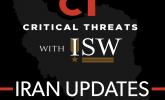Iran Update, March 23, 2023
March 23, 2023 - ISW PressSupreme Leader Ali Khamenei has trapped the Iranian regime by focusing public and government attention on improving the economy—an issue he does not yet appear willing to seriously address. Khamenei confined intra-regime debate to the economy—rather than addressing the socio-cultural issues that fueled the Mahsa Amini protests—and proposed various solutions to Iran’s economic problems during his Nowrouz address on March 21. Khamenei called for privatization, stating that “the most important problem and weakness of the country is the governmental nature of the economy.” Khamenei additionally acknowledged some critics’ use of the term “khasoulati”—meaning “state-controlled”—to describe the economic dominance of parastatal entities. Khamenei’s reference to this term confirms that he is aware of some of the arguments made by pragmatic hardliners, such as Parliament Speaker Mohammad Bagher Ghalibaf, about what role the parastatal establishment should play in Iran’s economy. Ghalibaf has explicitly called for parastatal organizations to decrease their involvement in the economy in recent weeks, as CTP previously reported. Khamenei’s recognition of and lip service to this conversation does not necessarily mean he is prepared to make the difficult decisions involved in seriously prying the economy from the grip of the state-owned economic giants. Meaningful privatization would require an overhaul of the Iranian economy which would likely take years to complete and would cause severe economic disruptions. Khamenei declined to take such measures when former President Hassan Rouhani advocated for them fervently, moreover. It is thus more likely that Khamenei is discussing privatization because he has designated the economy as one of the only acceptable topics of intra-regime debate.









